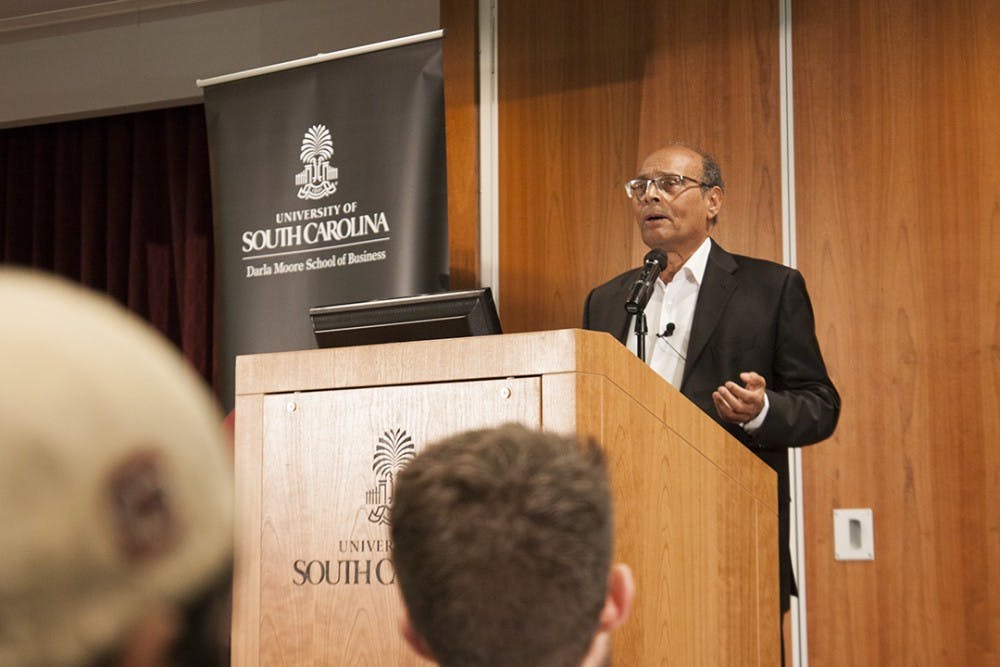Mohamed Moncef Marzouki reflected on his experiences as the first democratically elected president of Tunisia in his speech "The Jasmine Revolution and the Future of the Middle East” at the Hodges Forum on International Affairs Tuesday as part of his week long stay at USC.
Marzouki played a pivotal role in modern Middle Eastern history. He was the first democratically elected president of Tunisia after the Jasmine Revolution — a revolution that sparked a chain of rebellions known as the Arab Spring. Marzouki worked to find a middle ground between secularists and Islamist religious groups which has led to a stable, consensus-based democracy in Tunisia.
Marzouki felt it was important to share his ideas with students "so they can develop a more open mind and really understand the issues that other young people face."
He also expressed his views on the current situation in the U.S, and President Donald Trump.
"By supporting the Arab dictatorships, he is very much hurting human rights in those regions and may cause terrorism to increase," Marzouki said.
He said it's too early too tell if he will run in the next election, but his main objective now is as an activist, not a politician.
"I'm here to make more people aware of the situation that our country, that our region, is facing," Marzouki said.
Marzouki focused this forum on the lessons that we can learn from the Arab Spring and the Jasmine Revolution.
“It’s probably too early to make a final judgement,” he said, but he believes the youth of the Middle East will be able to set up stable democracies across the Arab nations even if it will be difficult.
Marzouki began his speech by reminding everyone that “the price people have to pay for freedom is high … and it’s probably just the beginning,” mentioning a high death toll across the Arab nations in revolt as well as the millions of people displaced across Syria, Libya, Yemen and Egypt. The problem, he said, is that the corrupt elites have not received the message and that with today’s “e-generation,” people are more aware of their corruption than ever.
This was followed up by a round table discussion featuring Marzouki and a panel made up by Robert Cox, director of the Walker Institute; Hamid Khan, deputy director of the Rule of Law Collaborative; Gerry McDermott, professor of international business; and Josef Olmert, adjunct professor of political science.
During this round table, Marzouki was asked a series of questions from the panel and audience regarding his opinion on the current events in the Middle East and what he thinks the future holds for the region.
He stressed the importance of technology in the Arab Spring and how it allowed people to organize protests. As president, he uploaded information about the government to allow for a more transparent democracy. Marzouki reiterated the point that the future of stable democracies in the Arab world lies in the hands of the “e-generation.”
The present Tunisian government is reinstating and pardoning accused corrupt officials from the old regime. Marzouki said that people expect a new political system or leader to fix everything immediately, and when that doesn't work they fall back on the old system.
"But give them time. Five years maybe," he said. "Then most likely someone like me will be elected again."
He ended on a high note, saying that Tunisia proves that it is possible to combine Islam and democracy. It also proves a free and fair election and a peaceful transition of power is possible in Arab nations.
“I thought the talk was really interesting,” said third-year biology student Christine Reid. "Coming in, I did not know much about the Jasmine Revolution, but hearing about it from someone who had actually been through it and then became [Tunisia’s] first president was pretty amazing."
The Hodges Forum on International Affairs was put together by Jim Hodges, a former governor of South Carolina. Hodges has a strong history with the state’s flagship university as his mother taught at USC and he and his children attended USC. Hodges said the purpose of these forum events was “about how we could bring provocative international speakers to our campus which stimulate thought not only about international affairs, but about business.”

